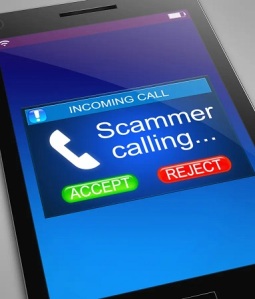
Have you ever received a phone call and the caller ID displays a phone number that is very similar to your own number, or it is the same as your phone number?
How does that happen? It is called spoofing and the caller is using a fake phone number. These types of scams are called Neighbor Spoofing and Reflection Spoofing. Neighbor spoofing is when you receive a call from a number that looks like your own. Often the same area code and first three digits of your phone number. The intention here is to make you think the call is local, coming from a “neighbor” so that you are more likely to answer the call. Reflection Spoofing is when the number looks like it is coming from your own phone number “reflecting” your number. The scammers hope that you will be curious enough to answer the call.
The intention with both scams is to get you to answer the phone so that they can steal private information from you that can be used for malicious purposes.
Don’t answer calls from numbers you don’t know, instead allow the call to go to voice mail. If it is someone you know they will leave a message and you can return the call. The more calls you answer from unknown scammers the more calls you will receive in the future.
What You Should Do When You Receive These Types of Calls
Do not respond to any questions. Even just a response that requires a yes or no.
Often if you do answer the call, it may be a recording and you might be instructed to press a number to opt out of future calls or connect you with a representative. Do not press any number. Doing so just confirms to the caller that your number is active.
Often the caller will threaten you will arrest, the caller may claim to be calling from law enforcement or a federal agency telling you that you must pay them or provide information to them to avoid legal action. This will never happen. Always consider this type of call a scam and hang up immediately.
The caller may tell you that you have won some type of prize but to receive it you must pay in advance. Never provide them with payment information. This is always a scam.
Another tactic they may use is making something sound like an emergency so that you will respond immediately. For example, scammers have called parents and grandparents telling them that their child or grandchild has been arrested and they need to provide bail money immediately. Do not fall for this type of threat. Hang up and call your relative directly.
When you receive suspicious calls, block the number. iPhones and Android phones both have an option to block phone numbers. You can also contact your service provider and ask them what tools they offer to block or warn of spam calls. Most providers now use some sort of spam identification utility that alerts you when a call is spam.
Many cell phones have a whitelisting tool. This allows you to block all unknown callers, calls from people not in your contact list. While this can be a useful feature it can cause problems because it can block calls you want to receive as well. For example, if you are expecting a call from your doctor, someone you do business with, a delivery service, etc. unless those callers have been added to your contact list those calls will also be blocked.
You can report these types of calls to the FCC (Federal Communications Commission) To quote their website, “By filing a consumer complaint and telling your story, you contribute to federal enforcement and consumer protection efforts on a national scale and help us identify trends and track the issues that matter most.”
Visit their complaint center page to file a complaint. FCC Consumer Complaints
If you have not already added your phone number to the National Do Not Call Registry do so. It will not prevent spam calls but it will add your name to a do not call list for sales and marketing calls
Scammers are using new tactics every day to trick people into revealing personal information about themselves that can lead to financial loss and identity theft. Stay vigilant.
